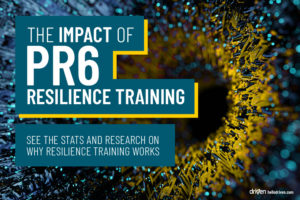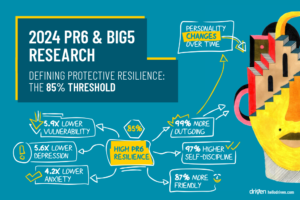Life is complicated.
It’s tough to keep track of everything going on, especially given that there is so much that we experience and are exposed to over time. This increasingly takes a toll on our mental health.
Consider our current predicament:
300 million people have depressive disorders
Over 260 million suffer from anxiety disorders
By 2030, the cost of mental health disorders is expected to reach $16 trillion
In Australia, one in five experience mental illness in any year, with suicide rates jumping 9% last year alone
What if we had a clear map that brought everything together in one view? Something that can find the hidden connections we are missing? Something that can help us truly make sense of mental health?
This is the concept of the ‘exposome’ – a life map, covering all our experiences and exposures over time that gives us a clear picture of our personal story, where we are at and where we are heading.
Why do Exposures Matter?
So much focus has been placed on mapping the genome, having been achieved with much fanfare after spending $2 billion on the effort. While the genome has given us many advances in healthcare, it turns out that it’s not as important as we thought.
In fact, the genome is only responsible for about 3.8% of cancer occurrences. Where do the rest come from? Chemical exposures, experiences, lifestyle and habits are the big contributors. This is what we map in the exposome. We know already that 35% of cancer is related to the exposome, about 10 times more than the genome. There is clear value in paying more attention to these factors.
The laser focus of medical specialisation is practical, but it leaves people feeling like they are not being listened to.
Mental health is even more related to these exposomic factors. Depression, anxiety, stress – these are mainly dictated by experiences and exposures over time. While there might be genetic predispositions, these can be overcome through compensating mental strategies and a healthy environment. At the end of the day, understanding and improving ourselves and our environment is the key to health and wellness. My big focus is on enhancing resilience, and this is an incredible new tool for this goal.
Origin of the Exposome Concept
Dr Chris Wild, director of the International Agency for Research on Cancer published a paper in 2005 that coined ‘exposome’ as a term and area of new research. Since then, exposome-related research has been rapidly growing, steadily building on a knowledge base that will eventually dwarf genome data simply because the exposome is a bigger concept.
While initial exposome research focused more on chemical exposures, the concept itself covers much more. Gary Miller, in his book The Exposome: A Primer, offered the following refined definition that captures the broad nature more clearly:
“The cumulative measure of environmental influences and associated biological responses throughout the lifespan including exposures from the environment, diet, behaviour, and endogenous processes”
Here we can see the natural combination of both physical and mental health. And the challenge, as we have a problem with much of the medical approach to healing – medical fields are siloed. We have medical practitioners specialising in all different fields looking for solutions based on their speciality. This laser focus of medical specialisation is practical, but it leaves people feeling like they are not being listened to. Patients know themselves and there is more to the story that they don’t get to talk about. Here is where the medical profession might miss important contributing factors to illness.
This is what we all inherently know about ourselves – it’s all connected! And this is what the exposome allows us to consider – an individual as a holistic being that encompasses many unique traits, habits, preferences, and connections between these. This gives us the ability to understand people in a complete way, enabling a new age of holistic healthcare.
A Little More Detail, Please!
An easy way to think about the exposome is that it begins where the genome ends and includes the building blocks of life after that. Collectively, we have the following:
Genome: This is your complete set of DNA contained in the chromosomes
Transcriptome: The totality of messenger RNA that translates the expressed genes
Proteome: All proteins that can be expressed by the genome, created through the transcriptome
Metabolome: All the small-molecule chemicals, including the microbiome, scaling up to the entire human organism
Of course, we do not end here. From your body outwards, we are exposed to the environment that includes food, sunshine, chemicals, pollutants, allergens and more. Next features the more complex exposures, like relationships with people, work and home environments, finances, studies; these include psychological, sociological and economic exposures.
In turn, these complex exposures affect the brain which affects hormones and neurotransmitters, resulting in changes to the metabolome and also epigenetic changes to genome expression. This means the genome transcription changes, resulting in different proteins being produced that flow back up to the metabolome, changing how we react and interact with the environment.
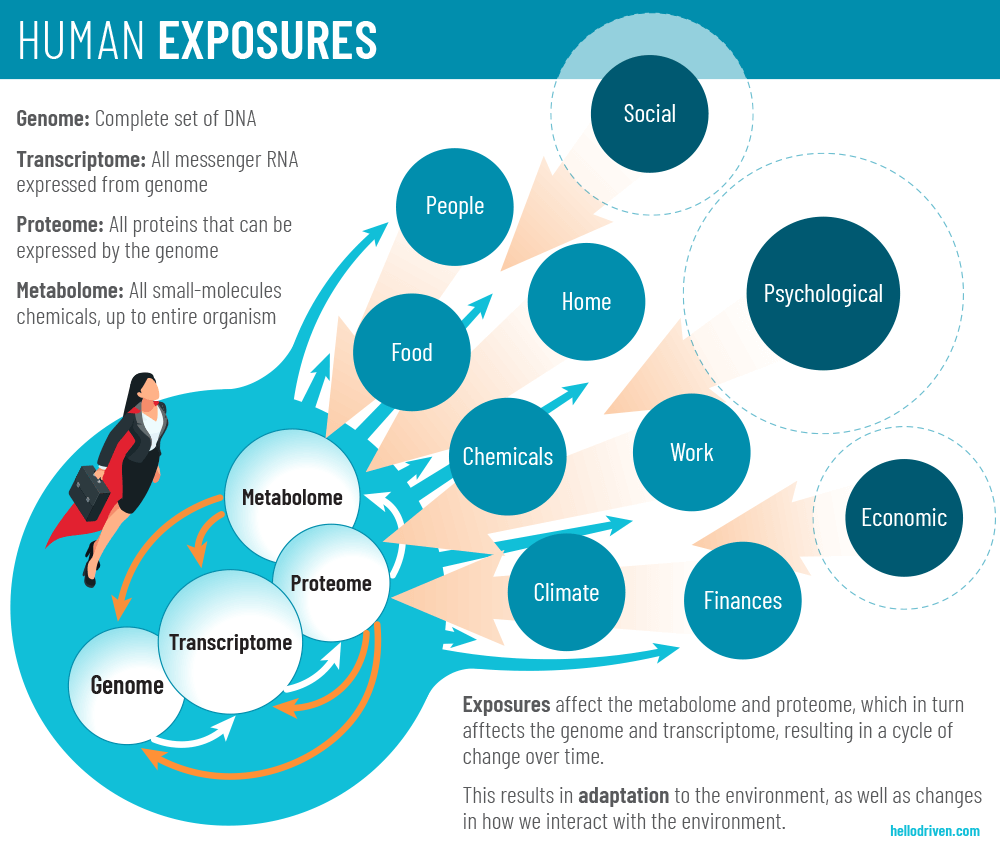
With this picture in mind, we can now clearly visualise how the exposome includes the transcriptome, the proteome, the metabolome, and all the external exposures that affect these. Essentially, everything except the genome. Truly a comprehensive concept!
I find this cycle fascinating because it makes it clear how connected it all is – from the DNA upwards to our environment and back down to how it changes gene expression, in turn changing how we behave.
A Revolution for Mental Health
This superconnection of our gene expression through to how we behave and how even the economic environment and climate affects us provides an important opportunity – to understand people in a holistic way. And by extension, find hidden connections to behaviour that we didn’t previously know about.
The concept of the exposome really makes it clear just how important behaviour, lifestyle and mindset is in determining our own future. This is where I see a particularly strong relevance of the exposome to mental health and wellness.
Most people have no close confidants to talk about what's most important to them
Toward the end of last year Miller and I exchanged some emails, and he agreed as well that this can open a new understanding of mental health. After all, the true strength of the exposome is in being able to determine the causative factors of illness by looking at an individual comprehensively over time.
There is so much more we can learn about human psychology and resilience by considering all these different areas together as a comprehensive view of who we are and what we are exposed to. Just think about what we can learn and how much better we can help people and even help ourselves if we had this holistic understanding of people. Truly a revolution for mental health, and importantly, preventative healthcare to curb the trends in depression, anxiety and suicide rates.
Making it Practical
Keeping in mind that it took $2 billion to map the genome, and the exposome is even bigger, it naturally follows that a complete map will be a global effort, and even then might never truly be complete.
Still, as Wild pointed out in his original paper, even a partial map is already incredibly useful. This is because it enables us to connect different spheres of life together and better understand what truly helps people live healthy lives – what is it that really gives us a sense of satisfaction and wellness.
By extension, being able to identify early if someone is heading towards depression or other mental health disorders and being able to intervene well in advance. Early detection is the pathway to reverse the spike in mental health disorders. In a time where most people have no close confidants to talk about what’s most important to them, it is critical to establish a highly secure space where people can be honest about where they are at, be given tools to help themselves, and the ability to reach out when things are not improving.
Our vision is to build a framework that brings together all these different factors into one view. To do this, we are working with top researchers around the world, bringing together various datasets to map out in more detail the psychosocial factors of the exposome. The result? A holistic picture of the factors that contribute to mental health and wellness. A central nexus that enables mental health practitioners and individuals to gain holistic understanding.
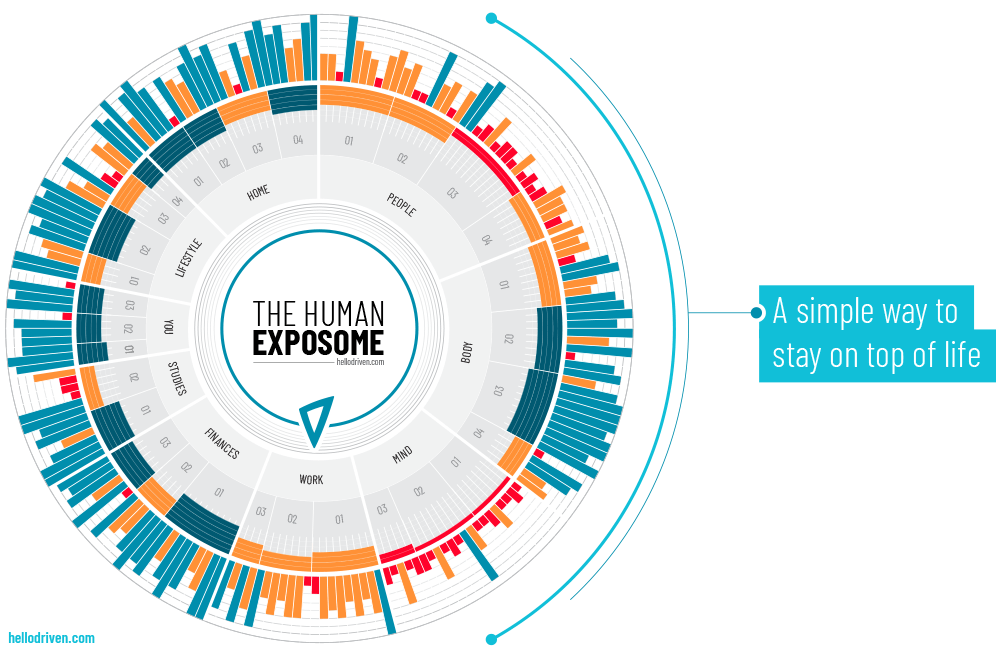
AI for Exposome-wide Mental Health
Looking at the multitude of factors that comprise the framework, a natural thought is – how do we get insight out of this? Good question! The exposome is big. Being able to draw meaningful conclusions from a complex concept is critical for it to be useful in a practical sense. Here is where we can use artificial intelligence for mental health to great effect.
By training an AI algorithm to consider all these factors over time, we can find hidden correlations and causative factors, enabling us to very quickly identify risk, even without a full picture. How? It all starts with the right training for the AI algorithm.
At Driven, we have access to longitudinal datasets to train an AI algorithm to be able to predict early on if someone’s mental health is vulnerable. Additionally, this algorithm can recommend preventative strategies to strengthen an individual and build resilience in an extraordinarily holistic way.
As we are building the new AI-assisted mental health practice, a framework like this will become ever more important, providing a comprehensive view of clients, not just now, but over time as well with predictions based on the client’s story. What’s more, this contextual understanding can help an AI provide more personalised and tailored advice, both to health practitioners, but also directly to individuals, such as what we are doing with our virtual coaching solution already.
Through this framework and AI-driven insights, we are building an incredibly useful new tool for mental health care, as well as preventative intervention. Here Driven is the first startup mapping the exposome at a broad level.
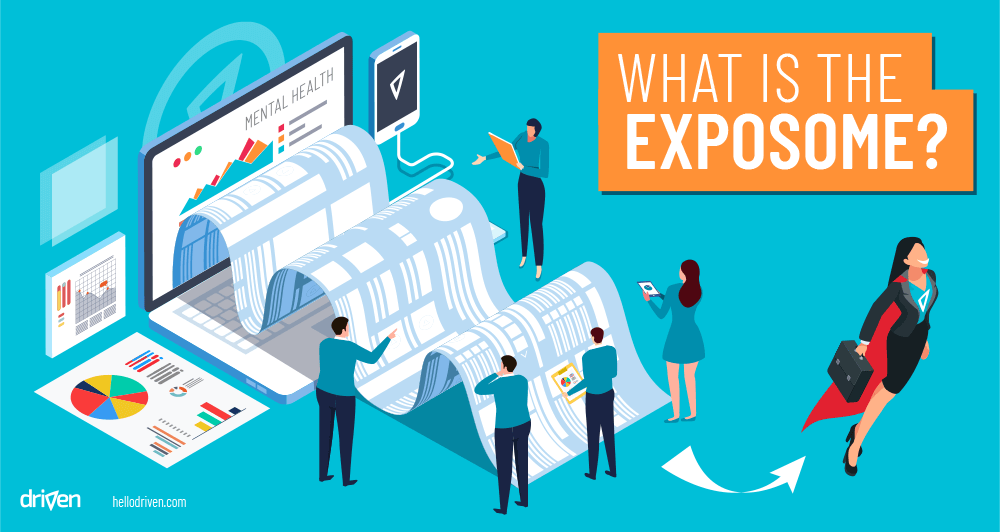
More Connection, Better Care
Bringing so much together in a simple map, an AI-powered exposome can fully take into account who you are, your situation, your history, and your future. This helps us better understand ourselves and also each other, building towards better human connection – something we are increasingly seeming to miss.
For mental health practitioners, this can mean being able to provide better care faster for individuals, helping people feel like they are truly being understood in all their uniqueness. I believe this is how we can curb the trends and start a new era of improving mental health worldwide. Thinking about this, I can see many benefits:
- For individuals – a simple way to stay on top of life, enabled through quick daily activities, check-ins and in-the-moment help
- For mental health practitioners – a comprehensive way to understand clients, using the power of AI to predict risk and inform direction of care
- For organisations – a fast and accurate way to analyse aggregated risk, along with specific recommendations on program choice and advice to improve workforce resilience
- For government & policy – data-driven understanding of what is missing from mental health initiatives, informing policy to reach national targets
I am really excited about this project as an enhancement to the great work we already do with psychologists and businesses around the world. We’re progressing quickly with the research and building ways to bring this out to people, connecting closely with what we’ve done in resilience so far with the Predictive 6 Factor Resilience Scale and the Driven Resilience Program.
What advantages do you see coming from a concept like this? Get in touch and let me know your thoughts!
All the best! Jurie

